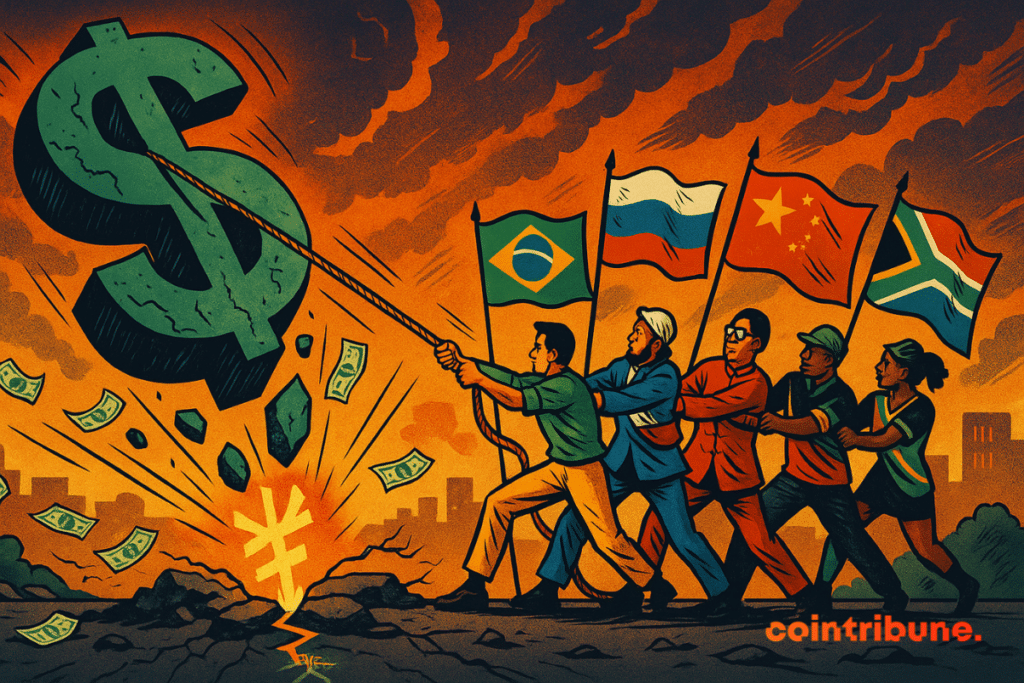BRICS Nations Ditch the Dollar—Here’s Why It Matters
The global financial order just got a seismic shakeup. The BRICS bloc—Brazil, Russia, India, China, and South Africa—is accelerating its de-dollarization push, and Wall Street’s pretending not to sweat.
No more ’exorbitant privilege.’ The dollar’s dominance is facing its most credible threat yet as BRICS nations pivot to local currencies for trade settlements. Gold reserves? Up. Dollar-denominated assets? Down. The Fed’s printing press just met its match.
Meanwhile, traditional finance clings to its SWIFT system like a security blanket—while BRICS builds alternatives. Cue the ironic applause for the ’stable’ banking system that still settles transactions slower than Bitcoin.
One thing’s clear: when the dust settles, the dollar won’t be the only game in town. And the suits? They’ll still be arguing about ’transitory’ inflation.

Realism Triumphs Over Monetary Idealism
While actively supporting the BRICS initiatives aimed at reducing dollar dependence, such as exploring alternative payment systems and gradually adopting blockchain technologies, Brazil has been more cautious regarding the feasibility of a common currency.
In a statement, Brazil’s director of monetary policy, Nilton David, broke the BRICS alliance momentum, announcing that no stock of assets denominated in the group’s currencies is currently substantial enough to compete with the US dollar.
Indeed, he asserted “that there is little chance this will change over the next decade”, referring to the US dollar’s dominance.
A statement heavy with meaning, especially coming from the country holding the rotating presidency of the BRICS bloc in 2025. This turnaround marks a clear retreat from Brazil’s historical positions, as it was once a fervent advocate for a monetary alternative to the dollar-centered system.
In light of this statement, several factors help understand the scope of this change in stance:
- The recognition of an economic reality: despite declared ambitions, no currency reserves or alternative system appears, in the short or medium term, able to effectively challenge the dollar’s place in international markets;
- A lack of internal cohesion within the BRICS: the very different approaches of members regarding monetary policy and reserve management make any collective initiative very difficult to coordinate;
- The absence of supranational governance: unlike the European Union with the ECB, the BRICS have no joint institution to steer a possible single currency, complicating any coherent dedollarization strategy;
- A persistent structural dependence: a large part of international trade, including that among bloc members, remains denominated in dollars. The transition would therefore be costly, lengthy, and technically complex.
In sum, by this declaration, Brazil seems to endorse a truth that many economists have been whispering for months: the dollar’s hegemony cannot be overturned by political will alone.
More than a joint project and symbolic declarations will be needed to erode its dominance.
A Global Political Context That Redefines Priorities
This strategic shift by Brazil takes place in a notably tense diplomatic context. Indeed, within the first 100 days of his second term, U.S. President Donald TRUMP threatened the BRICS with severe economic sanctions, notably through the imposition of tariffs as high as 150%.
This ultra-protectionist stance aims to punish the bloc’s initiatives related to the marginalization of the dollar in international trade. Although these threats have not yet been implemented, they weigh heavily on the political and economic calculations of the BRICS members BRICS.
This change in tone on Brazil’s side seems to reflect a willingness to de-escalate amid rising trade tensions with Washington. President Trump’s return has evidently cooled the eagerness for a frontal break.
Unlike Russia or China, Brazil remains economically very dependent on trade with the United States. Thus, this reality limits its room for maneuver and could explain this realistic reinterpretation of BRICS ambitions. In other words, it may not be an abandonment of dedollarization but a strategic slowdown motivated by the current situation.
While the Brazilian statement sounds like a retreat, it does not necessarily signal the failure of dedollarization. It could mark the beginning of a more cautious, longer, and more gradual phase where challenging the dollar’s hegemony will be done through peripheral adjustments rather than direct confrontation. Even if the BRICS’ single currency project seems abandoned, the alliance members will now have to contend with the headwinds of an unstable geopolitical environment and a renewed offensive of American unilateralism.
Maximize your Cointribune experience with our "Read to Earn" program! For every article you read, earn points and access exclusive rewards. Sign up now and start earning benefits.

